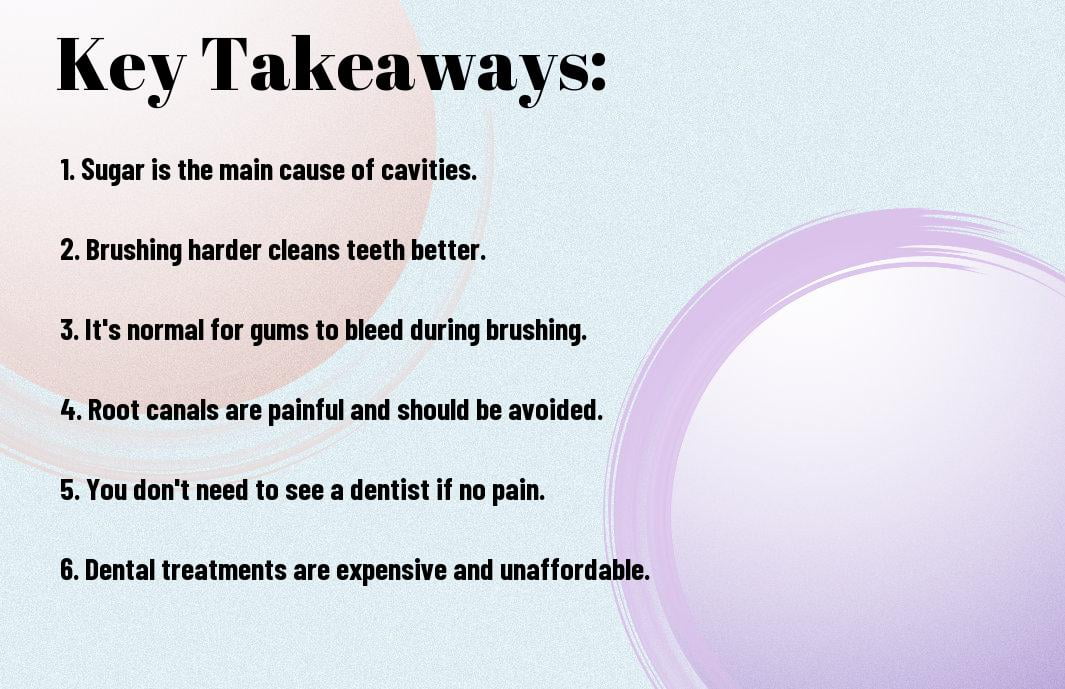Are you aware of the myths and misconceptions that could be affecting your dental health? It’s important to separate fact from fiction when it comes to taking care of your teeth. There are many common myths surrounding dental health and treatments that can lead to misinformed decisions and potentially harmful consequences for your oral health. In this informative blog post, we’ll address some of the most pervasive misconceptions and provide you with the truth about dental care and treatment options.
Key Takeaways:
- Regular brushing and flossing alone may not be enough – Many people believe that simply brushing and flossing their teeth is sufficient for maintaining good dental health, but regular dental check-ups and professional cleanings are also essential for preventing tooth decay and gum disease.
- Cavities are not the only reason for tooth pain – While cavities are a common cause of tooth pain, there are other potential reasons such as gum disease, dental infections, or even issues with the jaw joint that may cause discomfort. It is important to consult a dentist to accurately diagnose and treat the underlying problem.
- Dental treatments are not always painful – Thanks to advancements in technology and techniques, many dental procedures are now virtually painless. Patients should not let the fear of pain prevent them from seeking necessary dental treatments.
- Oral health can affect overall health – There is a strong connection between oral health and overall health. Poor oral hygiene can lead to systemic health issues such as cardiovascular disease, diabetes, and respiratory infections. It is important to prioritize dental health for the sake of overall well-being.
- Flossing is not optional – Some people believe that flossing is not necessary, but it is crucial for removing plaque and food particles from between the teeth, where toothbrush bristles cannot reach. Flossing plays a key role in preventing gum disease and maintaining good oral hygiene.
Debunking Myths about Daily Dental Care
Some people may have misconceptions about daily dental care that can affect the health of your teeth and gums. These myths can result in poor dental hygiene practices and lead to various dental issues. In order to maintain optimal dental health, it is important to debunk these myths and understand the truth behind them. For a more extensive list, you can refer to 7 Common Dental Myths and Misconceptions.
The Mythology of Brushing Hard for Cleaner Teeth
One common myth about dental care is that brushing your teeth harder and more vigorously will result in cleaner teeth. However, this is far from the truth. Brushing your teeth too hard can actually damage your tooth enamel and irritate your gums, leading to potential dental issues such as gum recession and tooth sensitivity. It’s important to remember that the key to effective dental care is using proper brushing techniques, not excessive force. Be gentle and thorough when brushing your teeth, using small circular motions to clean all surfaces.
The Illusion of Whiter Teeth Equating to Healthier Teeth
Another myth is that whiter teeth equate to healthier teeth. While having white teeth can be aesthetically pleasing, the color of your teeth does not necessarily reflect their overall health. Stained or discolored teeth can still be healthy, while white teeth can be affected by decay or other dental issues. It’s important to focus on maintaining good oral hygiene and regular dental check-ups rather than solely relying on the color of your teeth as an indicator of their health.
Misconceptions about Dental Treatments
For many people, the thought of undergoing dental treatments can be intimidating. However, there are several misconceptions surrounding dental procedures that can make you unnecessarily apprehensive. It’s important to debunk these myths to help you make informed decisions about your dental health.
The Overestimated Pain of Dental Procedures
One of the most common misconceptions about dental treatments is the overestimated pain associated with them. Many people avoid getting the necessary dental procedures done due to the fear of pain. However, with advancements in technology and anesthesia, the pain experienced during dental treatments is often minimal or almost non-existent. Your dentist will ensure that you are comfortable and pain-free throughout the procedure. So, don’t let the fear of pain prevent you from seeking the dental care you need.
The Misunderstood Necessity for Regular Dental Check-Ups
Another misconception about dental treatments is the misunderstood necessity for regular dental check-ups. Some people believe that as long as they brush and floss regularly, they don’t need to visit the dentist. However, regular dental check-ups are crucial for maintaining your oral health. Your dentist can detect and prevent potential issues such as cavities, gum disease, or oral cancer before they escalate into serious problems. By visiting your dentist regularly, you are taking proactive steps to protect your overall health and well-being.
Diet and Dental Health Misunderstandings
Now, let’s debunk some common misconceptions about the impact of diet on your dental health. Many people underestimate the role of diet in maintaining good oral health, leading to various misunderstandings and myths about the effects of certain foods and habits on your teeth and gums.
The Underestimated Impact of Sugar on Teeth
When it comes to dental health, one of the most widely misunderstood aspects of diet is the impact of sugar on your teeth. Consuming sugary foods and drinks can lead to the formation of plaque, which is a sticky film of bacteria that can erode the enamel of your teeth. Over time, this can lead to tooth decay and cavities. It’s important to be mindful of your sugar intake and to limit consumption of sugary treats and beverages to protect your teeth from decay and other dental issues.
The Overlooked Role of Acidic Foods in Dental Erosion
Another commonly overlooked aspect of diet and dental health is the role of acidic foods in dental erosion. Acidic foods and drinks, such as citrus fruits, sodas, and wine, can erode the enamel of your teeth, making them more susceptible to decay and sensitivity. Even though these foods and drinks may be enjoyable, it’s important to consume them in moderation and to take proper care of your teeth to minimize the negative impact of acidity on your dental health.
Children’s Dental Health Myths
Despite the advancements in dental care, there are still many misconceptions and myths surrounding children’s dental health. It’s important to be informed and aware of these myths so you can take the best care of your child’s oral health. Here are some common myths about children’s dental health that you should be aware of.
The Myth That Baby Teeth Do Not Require Care
One common misconception about children’s dental health is that baby teeth do not require as much care as permanent teeth. This couldn’t be further from the truth. Baby teeth are important for a child’s overall development, including speech development and the proper alignment of permanent teeth. Neglecting baby teeth can lead to decay, infections, and pain, which can affect a child’s overall well-being. It’s important to start good oral hygiene habits early, including regular dental check-ups and proper brushing and flossing.
The False Security of Fluoride in Preventing All Cavities
Another common myth about children’s dental health is the belief that fluoride alone can prevent all cavities. While fluoride is an important tool in preventing tooth decay, it’s not a foolproof solution. You still need to ensure that your child maintains good oral hygiene habits, including regular brushing and flossing, and a healthy diet. Additionally, excessive fluoride intake can lead to dental fluorosis, which can cause discoloration and damage to the teeth. It’s important to use fluoride appropriately and in moderation, under the guidance of a dental professional.
Summing up Common Misconceptions Or Myths About Dental Health And Dental Treatments
When it comes to dental health and treatments, there are many myths and misconceptions that can lead to misinformation and unnecessary fear. It’s important to understand that regular dental check-ups and cleanings are essential for maintaining good oral health, and that modern dental treatments are often painless and highly effective. You may have heard myths about fluoride being harmful or that sugar is the main cause of cavities, but the truth is that fluoride is a safe and important tool in preventing tooth decay, and cavities are caused by a combination of factors, not just sugar consumption. By staying informed and consulting with your dentist, you can debunk these common myths and make better decisions for your dental health.
Debunking 12 Common Dental Myths
FAQ
Q: Is it true that sugar is the main cause of tooth decay?
A: While sugar does contribute to tooth decay, it is not the sole culprit. The bacteria in our mouths produce acids when they break down sugar, which in turn erode the enamel of our teeth. However, poor oral hygiene, infrequent dental visits, and consuming acidic foods and beverages also play a significant role in causing tooth decay.
Q: Can’t I just brush my teeth harder to remove plaque and prevent gum disease?
A: Brushing your teeth harder can actually do more harm than good. Brushing too hard can lead to enamel erosion, gum recession, and damage to the tooth’s dentin. It is more effective to brush gently but thoroughly for two minutes, twice a day, and to supplement your oral hygiene routine with flossing and regular dental cleanings to prevent gum disease.
Q: Do dental treatments always have to be painful?
A: With modern advancements in dentistry, many dental treatments can now be performed with minimal to no pain. Dentists use anesthesia and sedation techniques to ensure patient comfort during procedures. Additionally, new technologies and techniques have made dental treatments more efficient and less invasive, reducing discomfort for patients. It is important to communicate any fears or concerns with your dentist so they can address them and make the experience as comfortable as possible.







